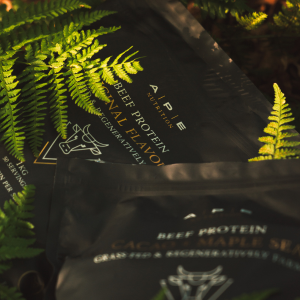Do your children eat liver? Heart? Kidney? How about colostrum or bone broth? Because despite what the government ‘health’ department advises, these are the foods that truly nourish growing brains and bodies…
Recently, more and more of you have asked us whether children can use our products, and the answer is yes! We recommend 1-3 capsules per day (see below) of the Beef Organs, Beef Liver or Celtic Oysters, opened mix sprinkled over food or into drinks for your little ones. These supplements provide vital micronutrients that modern diets often miss out, but giving children organs isn’t just about giving them extra nutrition, it’s about supporting their development and their essential needs.
- Under 5 = 1 Capsule per day
- 5 - 10 = 1-2 Capsules per day
- 10+ = 1-3 Capsules per day
The current guidance from the NHS advises:
‘Aim for your child to get most of their calories from foods like fruit and vegetables, and starchy foods like bread, potatoes, pasta and rice (preferably wholegrain versions). They should also have some beans, pulses, fish, eggs, meat and other protein foods, and some dairy or dairy alternatives.’ – NHS
The problem? Feeding children a diet that prioritises sugars in fruit and starch in vegetables and considers animal based foods only as an afterthought sets them up for gut dysbiosis, blood sugar dysregulation, as well as missing out on important nutrients that support brain development. Here, we’ll dive into the most important nutrients for babies and children, as well as our thoughts on how children can deeply benefit from an animal-based approach, and eating nose-to-tail.
First Foods…
Whether you breast fed your children or not, the first foods a baby consumes once they start eating solids are most supportive if they contain similar nutritional values to breast milk. This is because breast milk is perfectly ‘designed’ to support baby’s brain development, immunity, gut health and growth. Breast milk is largely made up of around 50% saturated fats (and this percentage increases in ‘mature milk’, meaning breastfeeding infants continue to receive high levels of saturated fats even when they reach 18 months), and this large percentage indicates how vitally important saturated fats are for growing babies. Saturated fats are essential for building cell membranes, transporting nutrients, and supporting the development of the gut microbiome, as well as ensuring baby receives good levels of vitamins A, D, E and K, which are needed for countless bodily functions.
Interestingly, breastfeeding mothers’ diets can influence the levels of saturated fats and other nutrients within breastmilk. Many traditional diets across the world encourage mothers to consume foods such as eggs (up to 10 a day in parts of Japan!), slow cooked meats and bone broth in order to not only nourish their own bodies but their baby’s too.
Nutrients For Growing Brains & Bodies
In order to promote healthy brain development, gut health and growth for little ones, it’s important that they receive plenty of animal-based foods. These foods support building, strengthening and resilience, as well as generally being easy to digest and absorb nutrients from, whereas many other foods that are typically recommended such as baby rice or cooked vegetables are devoid of important fats, hard to digest, and contain very little nutrients.
Much of our inspiration comes from the Weston A Price Foundation – a community based on traditional diets that nourishes families through every stage of life. Weston A Price travelled the world back in the 50’s and found that the healthiest children were the ones who consumed traditional diets high in animal foods. The foundation’s brilliant book The Nourishing Traditions Book of Baby and Childcare says:
‘While dieticians and government officials blithely assure the public that the low-fat, low-cholesterol diet they recommend for growing children carries no risk, the scientific literature on the subject, although sparse, indeed indicates that such diets short-change the growing child. One report details growth failure in children put on low-fat, low-cholesterol diet. Studies on European children brought up on low-fat, low-cholesterol macrobiotic diets showed poor growth, poor psychomotor development and numerous nutrient deficiencies.
Choose a variety of fats and oils to provide your child with a range of fat-soluble nutrients, but emphasise stable saturated fats found in butter, meat, lard, and coconut oil, and monounsaturated fats found in chicken, duck and goose fat, avocadoes and olive oil’
Here’s a list of some of the common ‘first foods’ we’re generally advised to try, and the issues with them, as well as the more nourishing traditional foods that truly support development. To be clear, we’re absolutely not shaming anyone with conversations like this – we’ve all had our own journeys through parenthood and have made our own mistakes, but coming together to learn and understand what our families really need is an important step in raising a truly healthy next generation.

The Nourishing Traditions Book of Baby and Childcare also highly recommends: ‘Bone marrow: (A rich, high-fat food bursting with factors that nourish the blood); Fish Eggs; and Whole Fish)
Nourishing Children
When it comes to providing our little ones with the most nutrient-dense foods possible, focusing on animal-based sources can ensure they receive easily-absorbed nutrients that support their growth and development, giving them the best start in life. Across the board, it is generally agreed that toddlers and children need the following nutrients in abundance, so we’ve put together a list of them, along with the best food sources:
Animal-Based Nutrients For Toddlers & Children
Iron: animal-based heme iron is much better absorbed by the body than plant based non-heme iron. Look for red meat, poultry, fish, organ meats – especially beef liver and beef spleen.
Calcium: Milk (raw or organic and unpasteurised), yoghurt, cheese, cream
Vitamin D: egg yolks, grass fed butter, oily fish
Omega 3s: oily fish, sea food, grass fed beef
Vitamin A: liver, egg yolks, dairy, fish
B12: Red meat, eggs, shellfish like oysters, fish, liver, dairy
Zinc: oysters, chicken, beef, pork, poultry, organs like liver, kidney and heart
Choline: egg yolks, liver, kidneys
Healthy saturated fats: grass fed butter, tallow, beef, lamb, pork, dairy
Why Children Need Organ Meats To Thrive
With their rapid rate of growth and development, focusing on nutrient density is one of the most valuable things we can do for our children today. Especially in a world that can present so many challenges for children (toxins, stress, pollution and too much time indoors) giving them high quality nutrition is an important way to protect them and help them build resilience. This is where organ meats come in; organs such as liver, heart and kidney are the most nutrient dense foods on the planet, providing a concentrated source of micronutrients children need in order to thrive.
By giving children small amounts of these organs on a regular basis, we can help them grow into strong, healthy, happy, intelligent and creative humans with powerful bodies and minds. Here’s a breakdown of our Grass Fed Beef Organs, and how they can benefit children:
Liver: Rich in choline for brain function and development, high in, b vitamins for energy and a healthy nervous system, vitamin A for immunity and vision, vitamin D3 for immunity and bone health, K2 for bones and gut health, copper for energy and immunity, selenium for thyroid function and zinc for metabolism, immunity and development of the senses. Children with low levels of zinc are also more likely to be ‘picky eaters’, so if your children are exhibiting this, you can use our Celtic Oysters too, to boost their zinc levels even more. Also a great source of iron for energy, immunity and brain function.
Heart: An exceptional source of vitamin B12, needed for nervous system function, mood, learning and energy production. High in CoQ10 which supports heart health, as well as being an important nutrient for improving symptoms in children with autism and ADHD. Heart is also high in iron and zinc for energy and immunity.
Kidney: High in iron needed for energy, brain function and to support rapid growth and development, B12 for energy production and nervous system health, selenium for thyroid function, zinc, and omega 3s which help reduce inflammation and support brain health and mood. Beef kidney is also high in DAO, which helps break down histamine and can help reduce symptoms of histamine intolerance linked to digestive issues, rashes and sleep disturbances.
An additional benefit of getting nutrients from real food-based sources is that the vitamins and minerals are naturally balanced and in the proportions we’d find them in nature, compared to synthetic supplements which can often be poorly absorbed or cause nutritional imbalances for children.
How To Incorporate Our Supplements Into Children’s Food
Choosing simple recipes and focusing on nutrient density can help give children what they need without making life complicated. Snacks and meals like scrambled eggs cooked with butter, beef bolognaise with hidden organs, Greek yoghurt bowls, grated cheddar cheese and liver pate are all simple ways to get plenty of goodness into your children on a regular basis. For a little inspiration on using our supplements in your children’s food, here are a couple of recipes to get started with. These meals can be shared with the family and make several portions:
Beef Bolognaise With Grass-Fed Liver
High in iron and B vitamins, this recipe is also a great source of copper, selenium and zinc, which all support immunity, energy and brain health.
Ingredients
· 1 pack grass fed beef mince (around 400g)
· 1 jar organic tomato sauce (brands such as Mr Organic are a great option if you’re short on time)
· 1 clove garlic, crushed
· 1 white onion, chopped
· Tsp dried basil or oregano
· 1 tbsp butter, coconut oil or tallow
· Pinch of salt and pepper
· 1 capsule grass-fed liver per child (and 1-6 capsules per adult)
Method
· Heat the oil or butter in a large pan, then fry the onion and garlic
· After a couple of minutes, add the mince and cook until browned
· Add the herbs and sauce and cook until the beef is cooked through
· Add salt and pepper to taste (optional)
· Divide between bowls, then open the beef liver capsules, sprinkle over and mix in
Serve with your choice of veg such as cooked root vegetables, rice of quinoa
Super Berry Smoothie With Beef Organs
This is a quick, sweet and very easy way to get the goodness of beef organs into your kids. Low-sugar fruits like berries provide antioxidants and vitamin C, whilst Greek yoghurt is high in protein for growing bodies. If needed, you can always swap the yoghurt for Biona organic coconut milk for a non-dairy option.
Ingredients
· 1 cup organic or wild blueberries
· ½ cup organic strawberries
· 1 cup Greek yoghurt
· 2 pasture-raised egg yolks
· The contents of 1 capsule beef organs per child
· Optional: 2 heaped tsp grass-fed colostrum for gut health and immunity
Method
· Add all ingredients to a blender and blend until smooth
· Pour into cups and enjoy, or add to a reusable smoothie pouch for babies and toddlers
Nourishing Our Children: Essential Animal-Based Nutrients For Kids
IRON
Benefits:
Brain development, immunity, energy, growth, oxygen transport, red blood cell production. Animal-based heme iron is much better absorbed by the body than plant based non-heme iron
Sources: Red meat, poultry, fish, organ meats – especially beef liver and beef spleen.
CALCIUM
Benefits: Bone health, healthy teeth, muscle function, nerve transmission.
Sources: Milk (raw or organic and unpasteurised), yoghurt, cheese, cream
VITAMIN D
Benefits: Bone health, immunity, healthy teeth, need for calcium absorption, and muscle health.
Sources: egg yolks, grass fed butter, oily fish
OMEGA 3s
Benefits: Brain development, learning, memory, mood, vision
Sources: oily fish, sea food, grass fed beef
VITAMIN A
Benefits: Eye health, brain development, immunity, skin health
Sources: liver, egg yolks, dairy, fish
VITAMIN B12
Benefits: Energy, nervous system, brain development, learning, memory, mood
Sources: Red meat, eggs, shellfish like oysters, fish, liver, dairy
ZINC
Benefits: Immunity, growth, metabolism, wound healing
Sources: oysters, chicken, beef, pork, poultry, organs like liver, kidney and heart
CHOLINE
Benefits: Brain development, learning, memory, mood, particularly important for development from conception to age 2
Sources: egg yolks, liver, kidneys
CHOLESTEROL
Benefits: building cell membranes, synthesizing hormones like oestrogen and testosterone, and aiding in vitamin D production
Sources: Eggs, red meat, organs, dairy, eggs, seafood
Written by Emma Newlyn
Emma is a health and nutrition coach who specialises in blending ancient wisdom and modern health techniques to help people feel well inside and out. Emma brings over 12 years of experience in the health industry to APE Nutrition, and specialises in answering your nutrition and supplement questions, and creating articles on many different areas of wellbeing.






